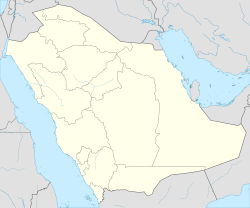Madinah
|
Medina المدينة المنورة Al-Madīnah al-Munawwarah Yathrib يثرب |
|
|---|---|
| The Radiant City | |

Clockwise from top left: al-Masjid an-Nabawi, Green Dome, al-Baqi' Cemetery, Quba Mosque, and Hejaz Railway Museum
|
|
| Location in Saudi Arabia | |
| Coordinates: 24°28′N 39°36′E / 24.467°N 39.600°ECoordinates: 24°28′N 39°36′E / 24.467°N 39.600°E | |
| Country |
|
| Region | Al Madinah |
| Government | |
| • Mayor | Khalid Taher |
| • Regional Governor | Faisal bin Salman bin Abdulaziz Al Saud |
| Area | |
| • City | 589 km2 (227 sq mi) |
| • Urban | 293 km2 (113 sq mi) |
| Elevation | 608 m (1,995 ft) |
| Population (2010) | |
| • City | 1,183,205 |
| • Density | 2,000/km2 (5,200/sq mi) |
| • Urban | 785,204 |
| Time zone | Arabia Standard Time (UTC+3) |
| Website | http://www.stats.gov.sa/sites/default/files/ar-maddinah_1.pdf |
Medina (/məˈdiːnə/; Arabic: المدينة المنورة, al-Madīnah al-Munawwarah, "the radiant city"; or المدينة, al-Madīnah (Hejazi pronunciation: [almaˈdiːna]), "the city"), also transliterated as Madīnah, is a city in the Hejaz region of Saudi Arabia that is also the capital of the Al Madinah Region. The city contains al-Masjid an-Nabawi ("the Prophet's Mosque"), which is the burial place of the Islamic prophet Muhammad, and is the second-holiest city in Islam after Mecca.
Medina was Muhammad's destination after his Hijrah from Mecca, and became the capital of a rapidly increasing Muslim Empire, first under Muhammad's leadership, and then under the first four Rashidun caliphs, Abu Bakr, Umar, Uthman, and Ali. It served as the power base of Islam in its first century where the early Muslim community developed. Medina is home to the three oldest mosques, namely the Quba Mosque, al-Masjid an-Nabawi, and Masjid al-Qiblatayn ("the mosque of the two qiblas"). Muslims believe that the chronologically final surahs of the Quran were revealed to Muhammad in Medina, and are called Medinan surahs in contrast to the earlier Meccan surahs.
...
Wikipedia

